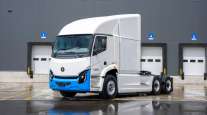Senior Reporter
Volvo Group, Natso Add Plans for Greater Electric Deployments

[Stay on top of transportation news: Get TTNews in your inbox.]
Truck maker Volvo Group and the travel plaza trade group Natso separately announced additional steps to ensure they assist in the infrastructure development and broader deployment of electric trucks.
Volvo formed Volvo Energy, a new business segment focused on providing electric and hydrogen fueling infrastructure and managing the flow of batteries over their life cycle.
Natso in a letter to the Biden administration outlined the market and incentive structure it believes would most effectively prompt existing fuel retailers to invest more in lower carbon fuels, including electric vehicle charging stations.
“[With Volvo Energy] our ambition is to offer our customers the most competitive solutions when it comes to electrification, including batteries and charging infrastructure,” said Volvo Group CEO Martin Lundstedt in a release.
Volvo Energy will be a business area with full profit and loss responsibility, according to the Gothenburg, Sweden-based company. The new unit will have both an internal role, providing batteries and charging solutions to the Volvo Group’s other business segments, and an external role, offering used, remanufactured and refurbished batteries to customers for use across different applications.

Rosenberg
Volvo Energy will also carry Volvo Group’s responsibility for hydrogen infrastructure solutions for fuel cell electric vehicles. Collaborations with various business partners and others across the ecosystem are expected to be key.
The truck maker’s North American brands are Volvo Trucks North America and Mack Trucks.
It said the roll-out of additional electric vehicles and related services later this year will include heavy-duty trucks for regional transports or construction — adding to electric vehicles for existing segments, including city buses, and trucks for waste management, construction and urban distribution plus compact excavators and loaders.
The company also announced Joachim Rosenberg, chairman of UD Trucks, will head the new business unit, effective this month.
Rosenberg will continue to run UD Trucks during the transfer of UD Trucks’ ownership to Isuzu Motors as part of the previously announced strategic alliance between Volvo Group and Isuzu Motors.
Meanwhile, Natso CEO Lisa Mullings said, “The case for new fuel strategies is enhanced when we utilize the ingenuity of the private sector.”

Natso represents more than 2,000 travel plazas and truck stops nationwide, owned by more than 220 corporate entities.
“We want to work constructively with the Biden administration and continue working constructively with Congress as more alternative fuels, including electricity, become part of the transportation mix,” said David Fialkov, vice president of government affairs for Natso.
“Drivers have come to expect a certain experience when they refuel,” he added, “and our members’ facilities are best equipped to accommodate them.”
Natso, along with the National Association of Convenience Stores and the Society of Independent Gasoline Marketers of America, outlined six principles that should guide the administration’s approach to lowering the carbon footprint of transportation fuel.
Among them:
- Establish performance goals without mandating specific technologies to allow for the benefits of innovation and technology development.
- Develop competitive market incentives to ensure a level playing field and provide long-term consumer benefits.
- Set consistent, uniform national policy so that the market has certainty to help it invest, and state policies do not create inconsistent or counterproductive measures.
Additionally, Natso is working with the National Highway Charging Collaborative — formed in 2019 in conjunction with electric vehicle charging vendor ChargePoint — to add electric vehicle charging to more than 4,000 travel plazas in the next decade.
Want more news? Listen to today's daily briefing below or go here for more info:




